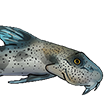The importance of TDS?
- tjudy
- Posts: 102
- Joined: 10 Sep 2004, 21:38
- My cats species list: 13 (i:0, k:0)
- My BLogs: 2 (i:0, p:93)
- Spotted: 24
- Location 1: Stoughton, Wisconsin
- Interests: aquariums
- Contact:
The importance of TDS?
I am curious about the importance of the TDS hardness and carbonate hardness in keeping and breeding the wild-caught Loricarids. I an absolutely anal about the conductivity of the water with my dwarf cichlids, many of which are kept in community with my catfish. Where can I find information about the water parameters other than temperature and pH on the waters these fish come from> The Cat-e-log entries do not tell TDS levels.
- Barbie
- Expert
- Posts: 2964
- Joined: 03 Jan 2003, 23:48
- I've donated: $360.00!
- My articles: 1
- My images: 15
- My catfish: 2
- My cats species list: 58 (i:0, k:0)
- Spotted: 8
- Location 1: Spokane, WA
- Location 2: USA
The only plecos I've ever had to worry about the TDS with are blackwater species. For those, it was important to stay below 100ppm and keep the pH in the low 6s to have fertile spawns. My tap pH stays relatively stable at 7.6-7.8 pH and I do not modify that for the tanks. With my aggressive water change regimen (OK, anal retentive water changing habits might be a more appropriate description) even the rainy seasons of straight RO changes rarely cause a drop in the pH at all. I will occasionally drop the TDS from 220 or so (our water is much softer this year than it has been in previous years where it was stable at 300 or more) to as low as 100 or a bit under with just the rainy season. They then get no changes for a week and there's always enough buffer left to keep the pH from falling more than a couple tenths of a point.
While there are many blackwater species of plecos to match with your Apistos and what not, there are also many of the whitewater variety that honestly could care less. Let me also mention that the blackwater species thrived in my tap water. It was only for spawning that I had to modify the conditions.
To my knowledge, there is quite a bit more information available about the exact water parameters of certain river systems in the books about cichlids. I'll sort through some of my bookmarks today and see if I can find the one good link I had for Brazil that had much of that information but was totally non fish related. I'm not sure I remembered to rename it and it's definitely not jumping out of the list at me ;).
Barbie
While there are many blackwater species of plecos to match with your Apistos and what not, there are also many of the whitewater variety that honestly could care less. Let me also mention that the blackwater species thrived in my tap water. It was only for spawning that I had to modify the conditions.
To my knowledge, there is quite a bit more information available about the exact water parameters of certain river systems in the books about cichlids. I'll sort through some of my bookmarks today and see if I can find the one good link I had for Brazil that had much of that information but was totally non fish related. I'm not sure I remembered to rename it and it's definitely not jumping out of the list at me ;).
Barbie
- Janne
- Expert
- Posts: 1765
- Joined: 01 Jan 2003, 02:16
- My articles: 10
- My images: 241
- Spotted: 73
- Location 2: Belém, Brazil
- Contact:
I have the same experience as Barbie but I have not tryed to breed in a conductivity above 300 µS (TDS 150 ppm).
Blackwater species seams to be more sensitive when it comes to breeding in harder water then 150-200 µS (TDS 75-100 ppm), if they do they usually kick the eggs out of the cave and the male dont spill any energy for the eggs.
A lower pH between 6,0-6,5 and a conductivity between 120-150 µS solve this problem with most of the blackwater species.
Janne
Blackwater species seams to be more sensitive when it comes to breeding in harder water then 150-200 µS (TDS 75-100 ppm), if they do they usually kick the eggs out of the cave and the male dont spill any energy for the eggs.
A lower pH between 6,0-6,5 and a conductivity between 120-150 µS solve this problem with most of the blackwater species.
Janne
- Janne
- Expert
- Posts: 1765
- Joined: 01 Jan 2003, 02:16
- My articles: 10
- My images: 241
- Spotted: 73
- Location 2: Belém, Brazil
- Contact:
No, L46 H. zebra are not a blackwater species but Rio Xingu is a very soft and a clear water river. Hypancistrus species dont usual kick the eggs out if there are a problem...the male eat them instead, I have so far only experied Ancistrus and Peckoltia species to not eat the eggs. Do you have 2 males in your tank? if so...take one out and only left the most dominant male in the tank together with the females, to breed Hypancistrus species in colonies needs lots of caves and lots of females to keep them busy with other thing then to fight about the best cave and the females.
Janne
Janne




